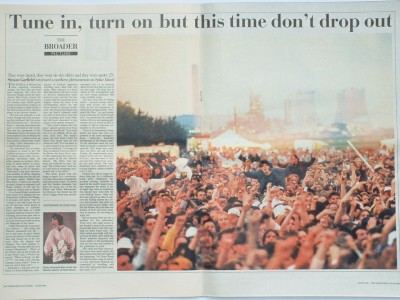Artefact

Centre page spread from The Independant on Sunday 3rd June 1990, review of Spike Island.
The chemical plant & cooling towers in the background made it one of the strangest settings for a gig I can remember.
The review:
The people of Widnes had been expecting something strange, but they may not have been expecting this. Over the Runcorn Bridge, across the Manchester Ship Canal, around the town in ever more fervent waves last Sunday came 30,000 gentle young revelutionaries walking on boarded bridges to Spike Island, a flat field surrounded by chemical plants in the Mersey estuary.
This was not primarily a rock crowd, though with little prompting they professed that the group they had come to see - The Stone Roses were the most important rock n roll band in the world. This was the apothesis of the Manchester Scene - a dance crowd, an Acid crowd, a Sixties-style crowd, a cocky, tribal celebration of a northern phenomenon.
The movement has no name grounded as much in the Old Trafford terraces as in Manchester's house dance clubs, it's proponents two-thirds male, all white, possess no common ethos some of them believe in peace and love, some in peace and cheap drugs, a few in menace. There bond is the gear: devotees sport swaithes of heavy flapping denim spreading from the hip not the knees nearer Oxford bags than flares, T-shirts and smocks, tie-dyed, striped or sloganed; and floppy sunhats pulled down to eye level.
It is a loose fitting anonymous strip, much of it designed by the Manchester outfitters Joe Bloggs. It all looks cool (never "hip" or "trendy"), but only if you are under 25 and have never heard of Abbie Hoffman or Zabriskie Point. And this show, in a field regarded until last week as a bird watching and beauty spot, was to be their Woodstock; the one show that pop historians would recall as the flashpoint of the scene.
Unlike Woodstock it was not a free festival - this being the 90's admission cost £14 - but it was loose in spirit. Only the slogans had changed. The most popular t-shirts read "On the sixth day God created Manchester", "Born in the North", exist in the north, die in the north. On stage a DJ, twisting Timothy Leary slogans yelped "Tune in, turn on, don't drop out!"
Swearing is a big part of it all. There is a beery bohomie, reminiscent of football supporters travelling away, thick with civic pride. What emerges is a belief that Manchester has been central to Britain's independent music scene for years, and that the time is again right for something big to happen. Above all there is an overwhelming desire for the Stone Roses to succeed worldwide. The process has begun: last year the bands followers could see them in local dives; now they were grappling with warm Pepsi and oily meats dispensed to long queues from grubbing marquees.
"This is not a fashion that will pass", agreed a group of six from Chorlton-cum-Hardy. "You could see it as an attitude. We're just cool, dead cool. The music's great, the best there's been for years. Way better than all that electronic stuff. You can dance to it, and if inspires you and you feel part of something".
The Stone Roses took the stage at sunset. For a revolutionary band, they pump a remarkably unrevolutionary sound. The Byrds and the Beatles dominate, but there are traces too of the Sex Pistols and fellow Mancunians Joy Division. Ian Brown has the air of a Jagger about him and the unwashed face of an innocent afloat for the first time on a sea of sex and sugar. His band met at school in the mid 80s and are now strong musicians with some excellent songs.
But their lyrics tell of nothing much - arrogant teenage aspirations with prickly love twists. They do not see themselves as subversives, perhaps wisely. "Elizabeth my dear" an anti-royalist crack to the tune of "Scarborough Fair" was mocked by the stadium cliches of dry ice and spinning glitter balls, the sort found in Mecca ballrooms nationwide in the 70s.
There is no Manchester scene dance, but most who were not jammed at the front managed a loose, trance-like hand-flail popularised in the House clubs. As the afternoon wore on, eyeballs developed a tendency to roll upwards. Soft drugs were common , but there was talk of how Ecstasy, the amphetamine party-popper of the last two "Summers of Love" was now hard to find and had been replaced by cannabis and amyl nitrate. The band themselves have admitted to favouring sulphate widely available at £5 a kick.
Publicly they will no longer endorse drug use. At a confrontational press conference the previous evening, attended by much of the world' s music press, they dismissed the cliches of the all night orgy band as something that should have died with the early Rolling Stones. They said they had rejected an offer to support the Rolling Stones on a recent tour because they were too good to play second fiddle.
But at present they are not a problem for the authorities. There were only 8 arrests at last Sundays concert; the promoters put this down to the beer running out 3 hours early. The show ended punctually with fireworks at 10.35pm, after which the Roses admirers departed with senses dulled to the merchandise stall and the vans and coaches in the gridlocked car park.
The ritual has been observed. The band were much richer, the fans content that they were part of the happening. The Stone Roses will play the same songs in America soon and many die-hards are committed to travelling with them.
Latest Discussion
If you'd like to leave a comment, please
Login
